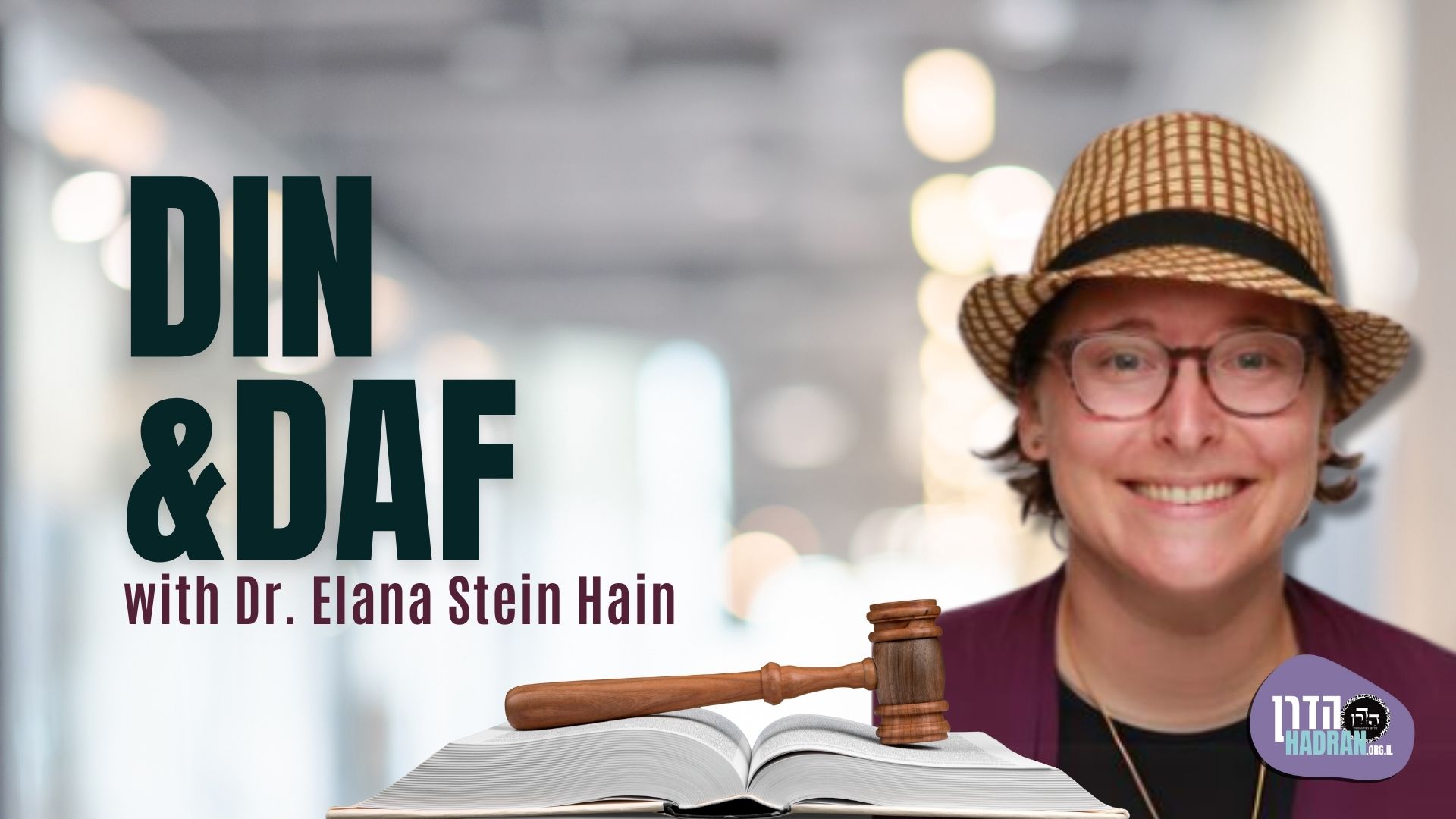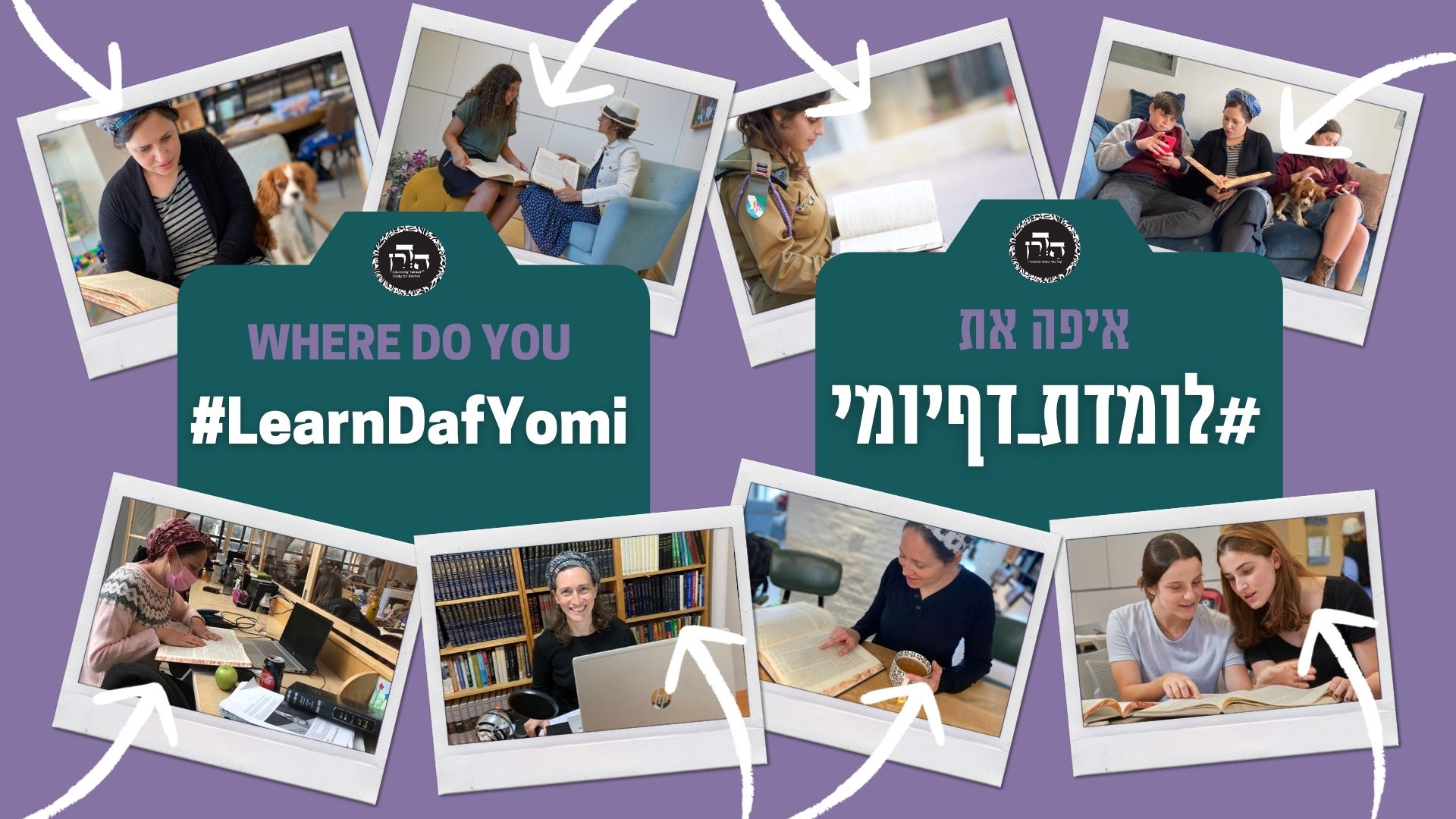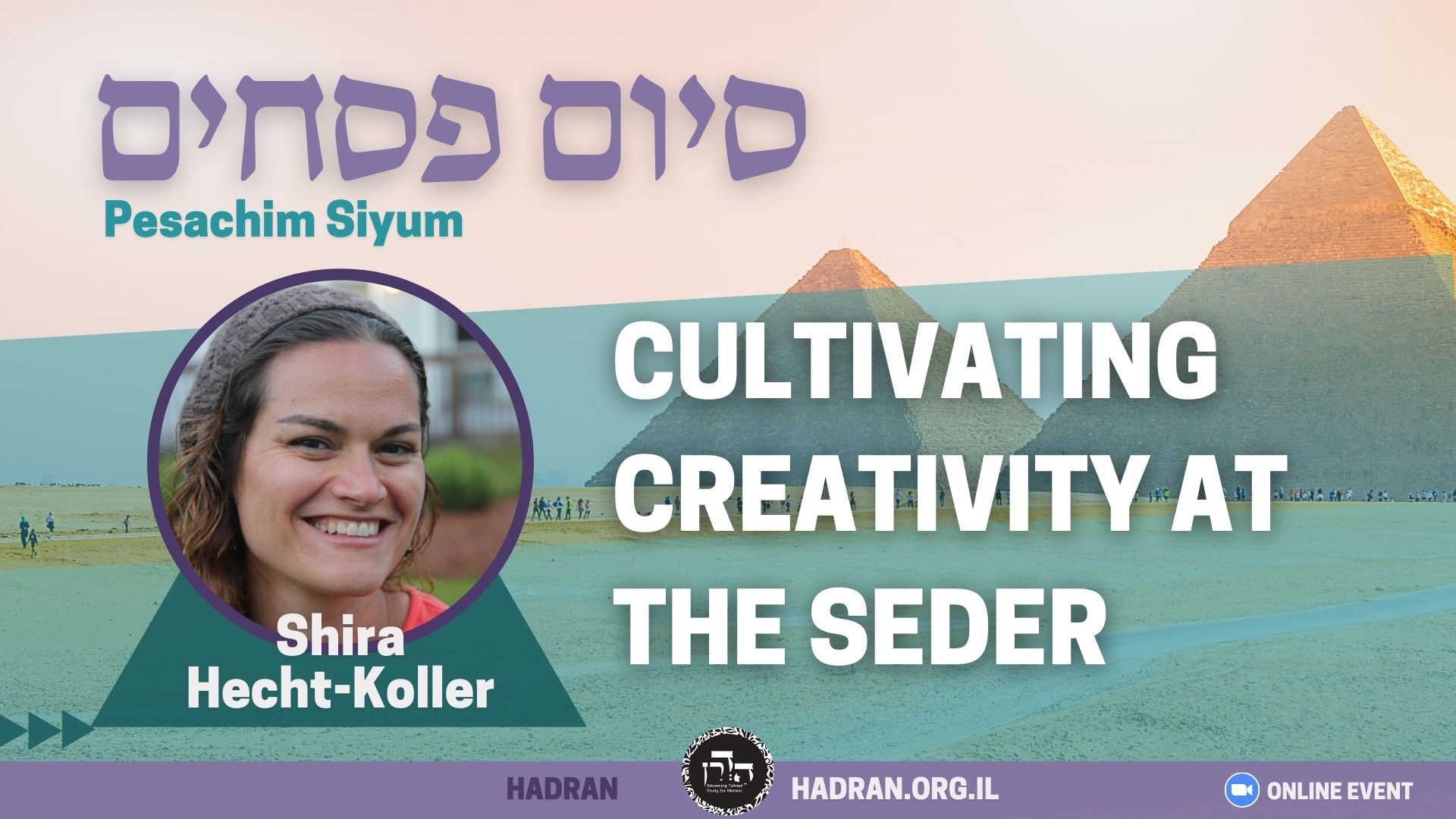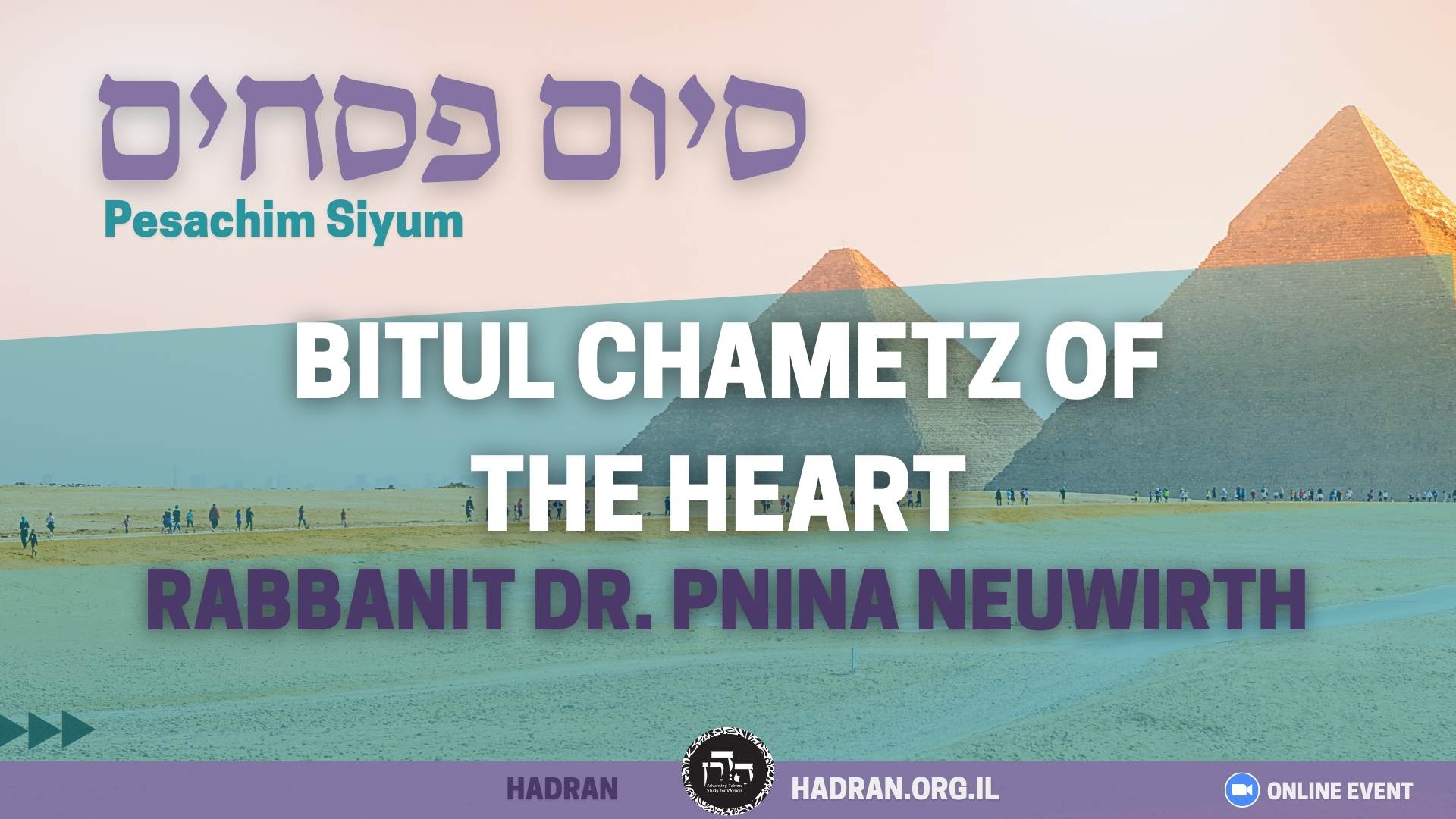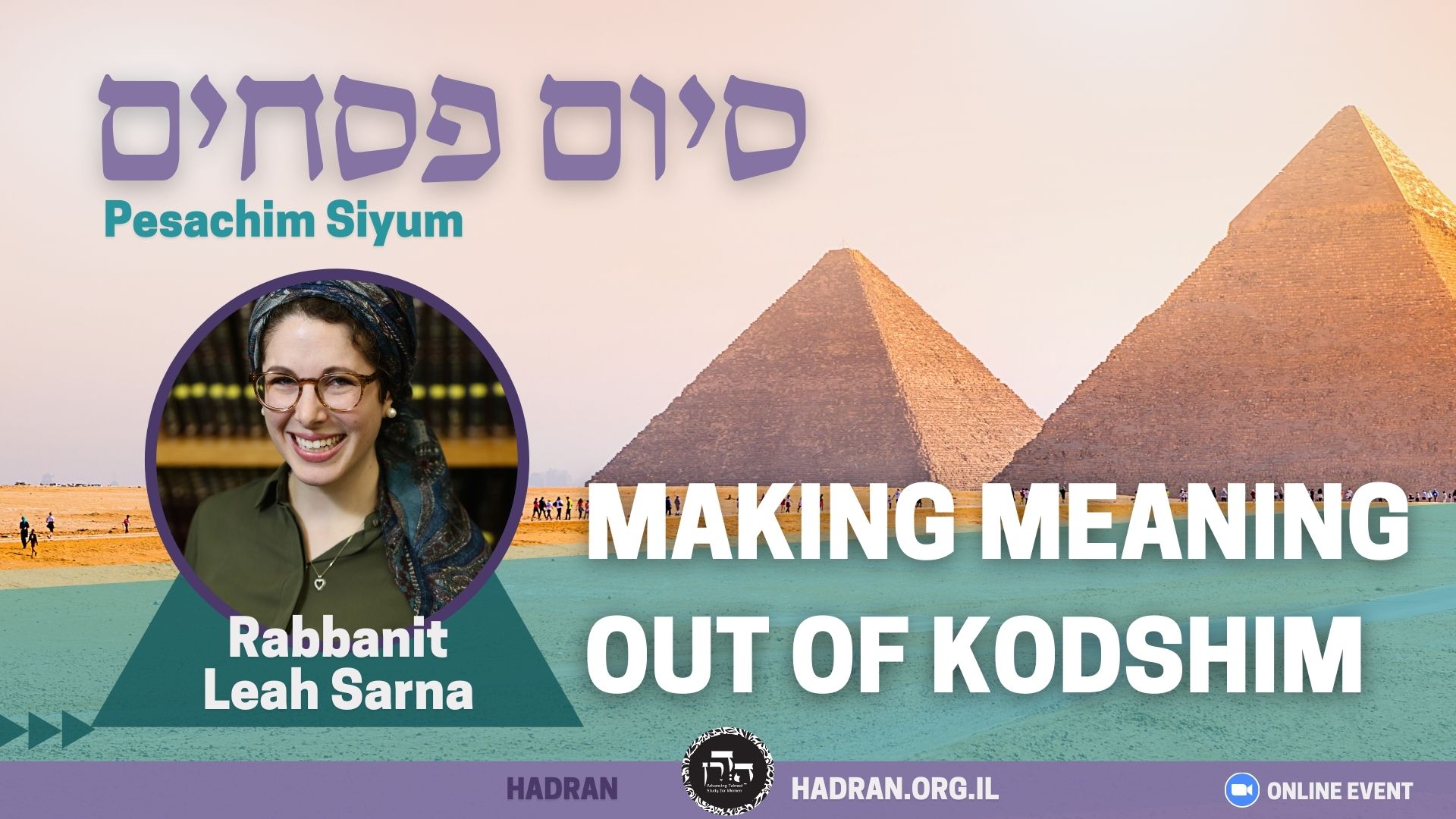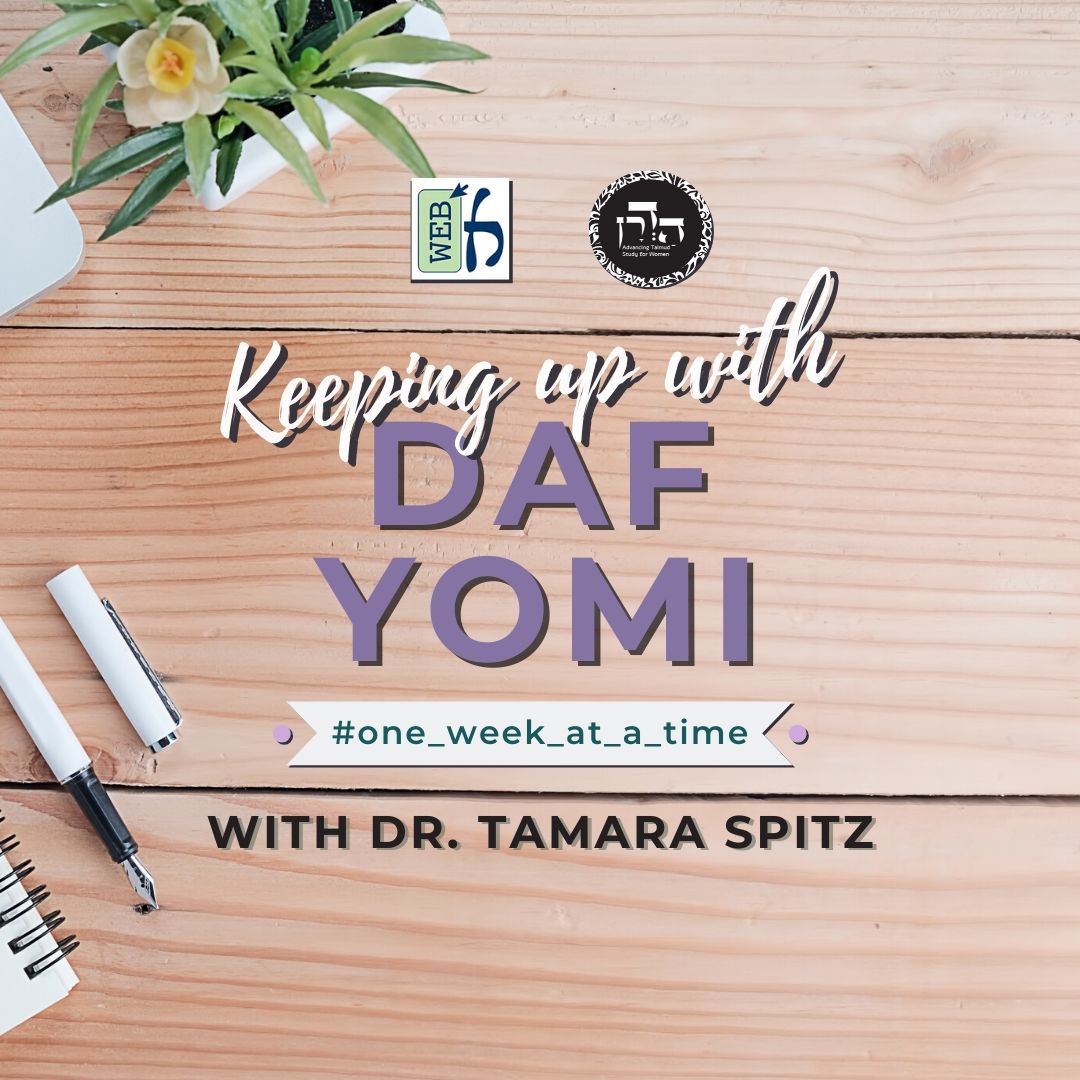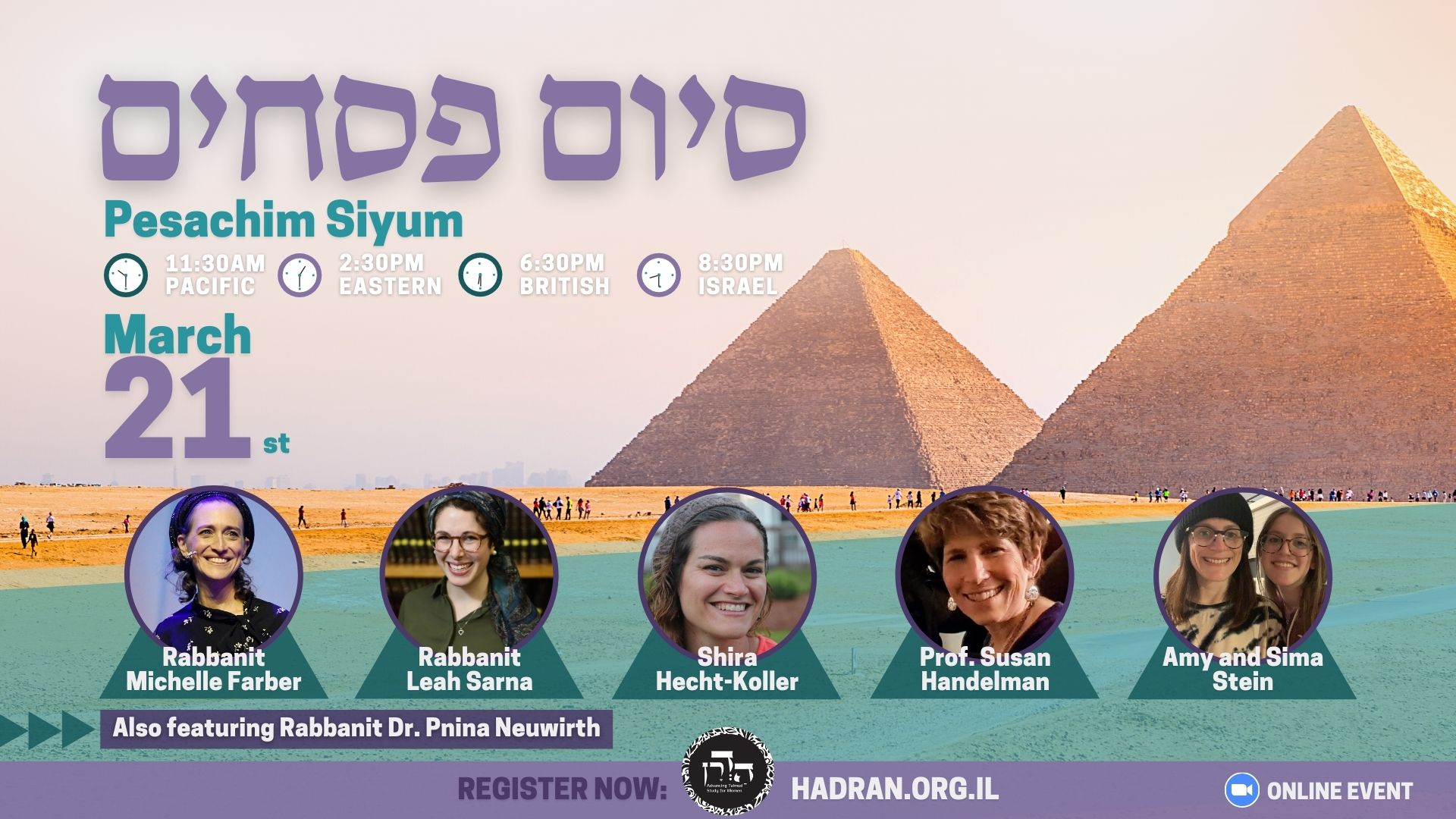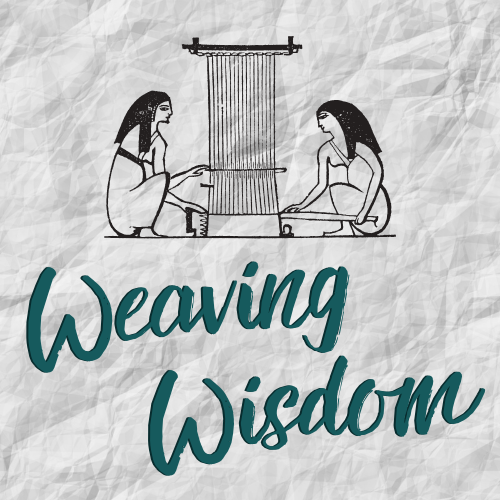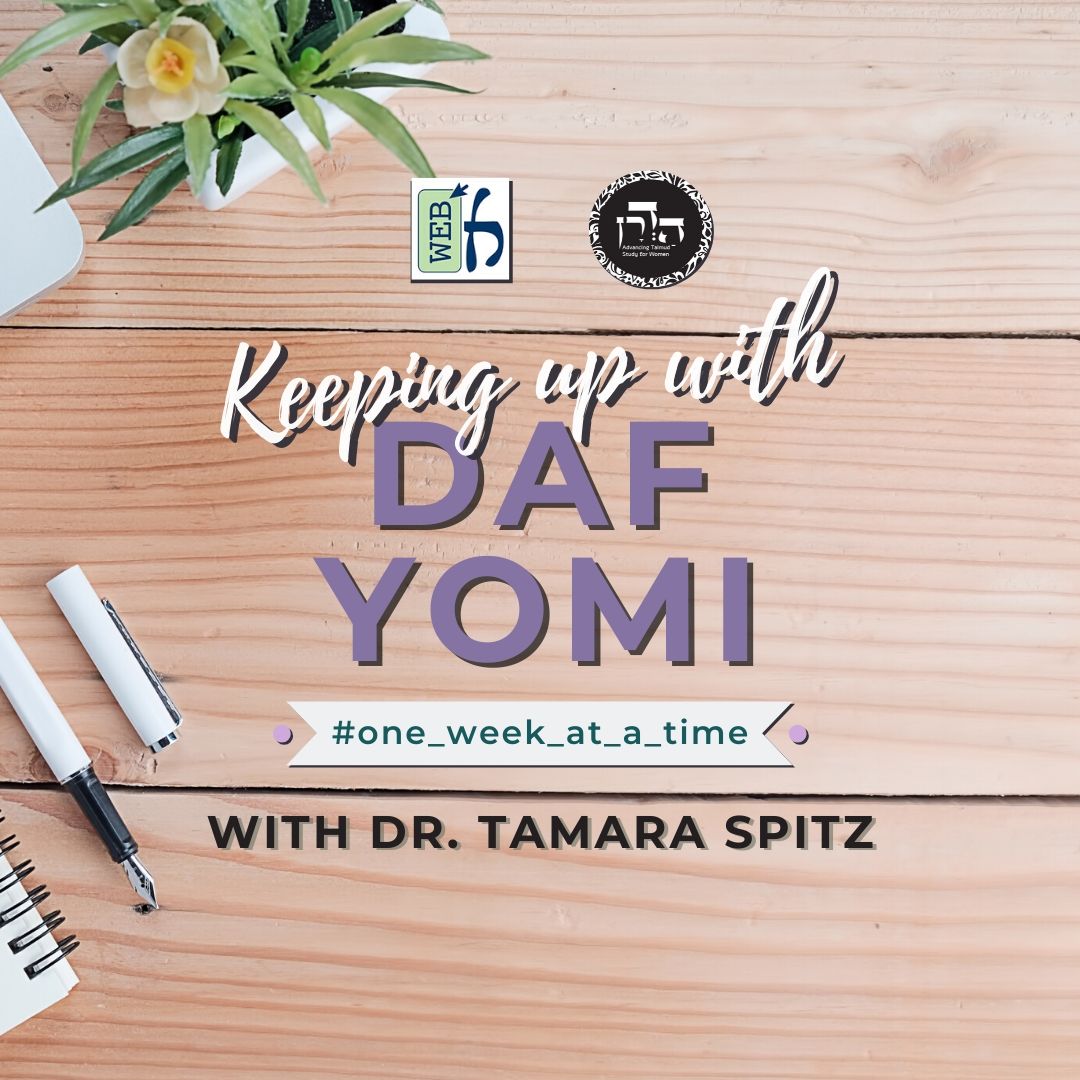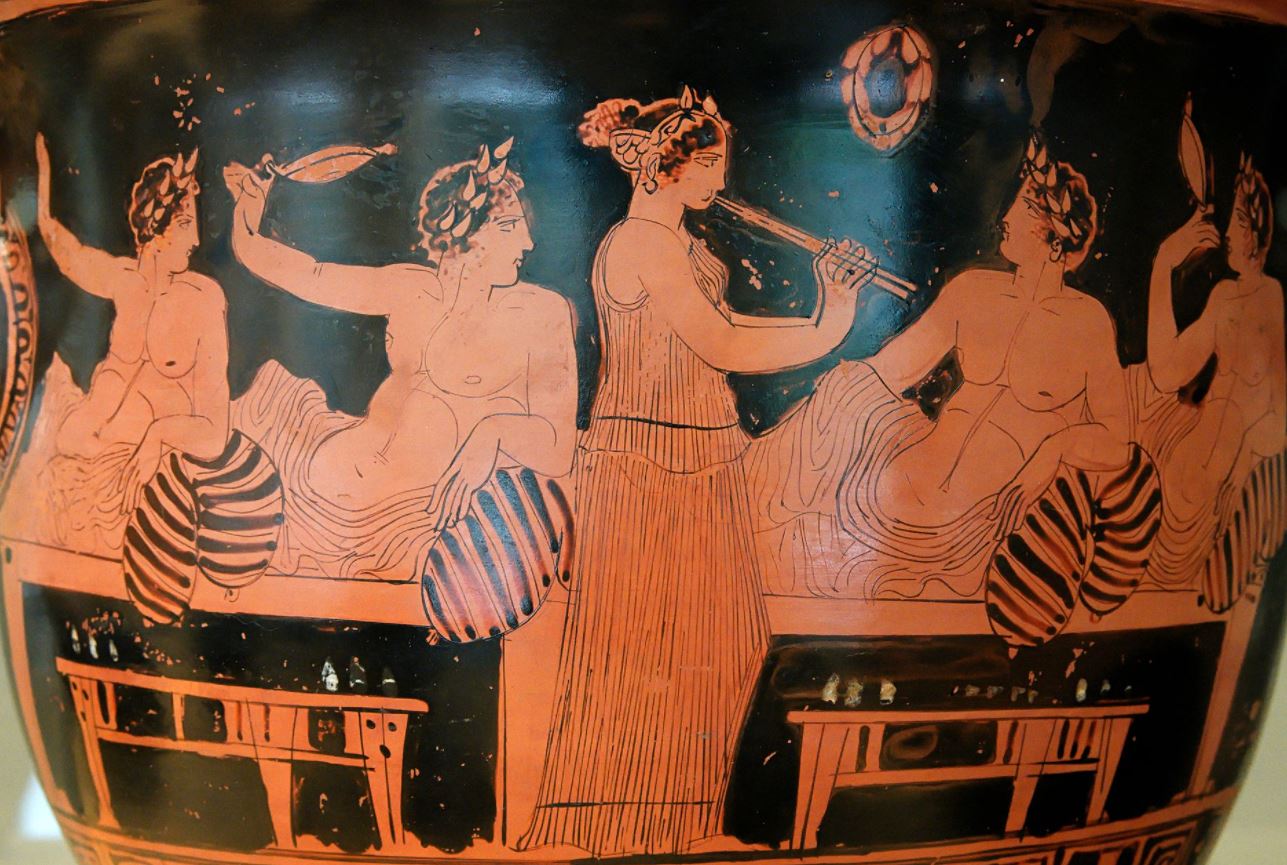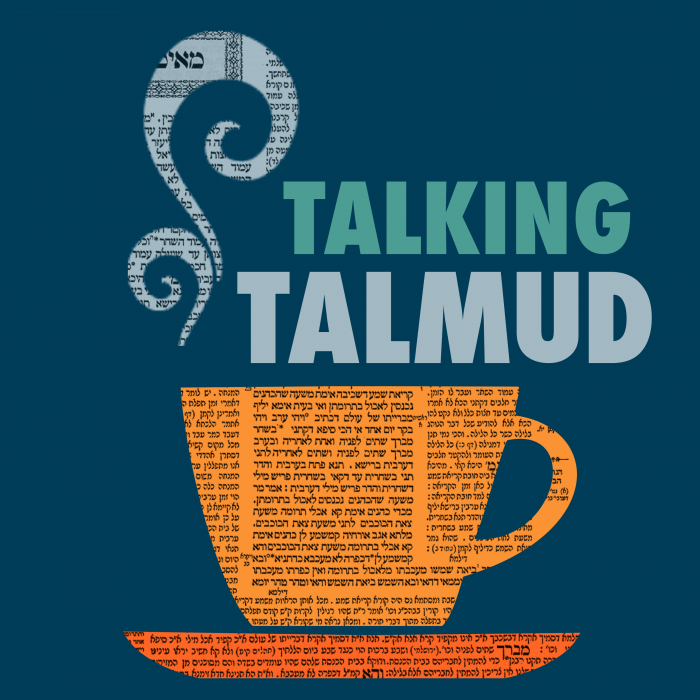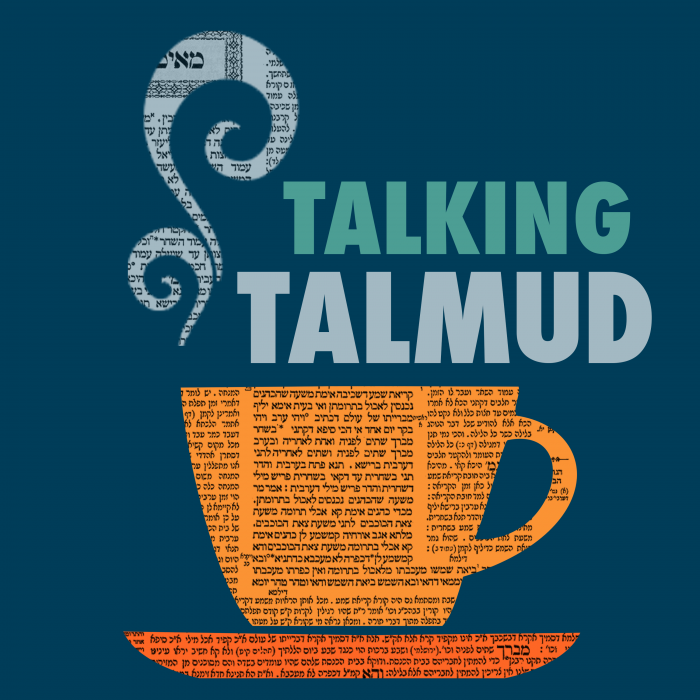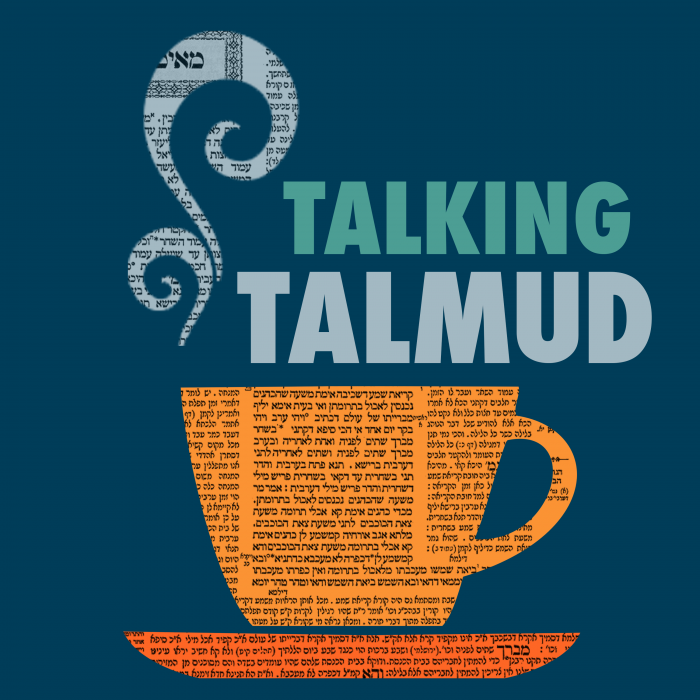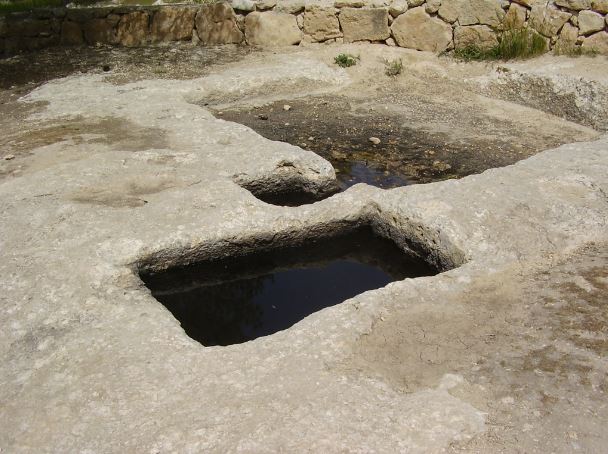What are the laws for one who designates an animal for a Pesach sacrifice that cannot be used as it is too old or female? What if one dies before the sacrifice is brought? What can the inheritors do with the animal? On what does it depend? What if a Pesach gets mixed up with other sacrifices and one does not know which is which? What if one group’s animal got mixed up with another’s?
This week’s learning is sponsored for the merit and safety of Haymanut (Emuna) Kasau, who was 9 years old when she disappeared from her home in Tzfat two years ago, on the 16th of Adar, 5784 (February 25, 2024), and whose whereabouts remain unknown.
This week’s learning is dedicated of the safety of our nation, the soldiers and citizens of Israel, and for the liberation of the Iranian people. May we soon see the realization of “ליהודים היתה אורה ושמחה וששון ויקר”.
This week’s learning is sponsored for the merit and safety of Haymanut (Emuna) Kasau, who was 9 years old when she disappeared from her home in Tzfat two years ago, on the 16th of Adar, 5784 (February 25, 2024), and whose whereabouts remain unknown.
Want to dedicate learning? Get started here:


Today’s daily daf tools:
This week’s learning is sponsored for the merit and safety of Haymanut (Emuna) Kasau, who was 9 years old when she disappeared from her home in Tzfat two years ago, on the 16th of Adar, 5784 (February 25, 2024), and whose whereabouts remain unknown.
This week’s learning is dedicated of the safety of our nation, the soldiers and citizens of Israel, and for the liberation of the Iranian people. May we soon see the realization of “ליהודים היתה אורה ושמחה וששון ויקר”.
This week’s learning is sponsored for the merit and safety of Haymanut (Emuna) Kasau, who was 9 years old when she disappeared from her home in Tzfat two years ago, on the 16th of Adar, 5784 (February 25, 2024), and whose whereabouts remain unknown.
Today’s daily daf tools:
Delve Deeper
Broaden your understanding of the topics on this daf with classes and podcasts from top women Talmud scholars.
New to Talmud?
Check out our resources designed to help you navigate a page of Talmud – and study at the pace, level and style that fits you.
The Hadran Women’s Tapestry
Meet the diverse women learning Gemara at Hadran and hear their stories.
Pesachim 98
הַמַּפְרִישׁ פִּסְחוֹ וּמֵת, לֹא יְבִיאֶנּוּ בְּנוֹ אַחֲרָיו לְשֵׁם פֶּסַח אֶלָּא לְשֵׁם שְׁלָמִים.
With regard to one who separates his Paschal lamb and then dies, his son may not bring it after him for the purpose of a Paschal lamb because it may no longer be used for that purpose after its owner has died. Rather, it is brought for the purpose of a peace-offering.
גְּמָ׳ אָמַר רַב הוּנָא בְּרֵיהּ דְּרַב יְהוֹשֻׁעַ: שְׁמַע מִינַּהּ תְּלָת. שְׁמַע מִינַּהּ: בַּעֲלֵי חַיִּים נִדְחִין.
GEMARA: Rav Huna, son of Rav Yehoshua, said: Conclude three halakhot from this mishna, concerning one who separates an unfit sheep as a Paschal lamb: Conclude from it that living things can be permanently deferred; not only is a sacrifice that has already been slaughtered permanently deferred, but so is a living animal that has been separated as a sacrifice for which it is unfit. This is clear from the fact that a female animal separated as a Paschal lamb is not offered as a peace-offering, but rather redeemed for money, which is then used for free-will offerings. This mishna clearly supports one side of a dispute on this issue in tractate Yoma 63b.
וּשְׁמַע מִינַּהּ: דָּחוּי מֵעִיקָּרָא הָוֵי דָּחוּי. וּשְׁמַע מִינַּהּ: יֵשׁ דִּחוּי בְּדָמִים.
And furthermore, conclude from this that deferral at the outset, when the lamb is first consecrated, is considered a permanent deferral; even though the female animal was never fit for use as a Paschal lamb and therefore one might have thought that it should be brought as a peace-offering, the fact that it may not be brought as a peace-offering indicates that it has been completely deferred. (See tractate Sukka 33b for an opposing view.) And conclude from this that there is deferral not only with regard to the offering itself, but also with regard to the money of that offering, as the proceeds from the sale of the offering are used for free-will offerings rather than peace-offerings (Rabbeinu Ḥananel).
הַמַּפְרִישׁ פִּסְחוֹ וְכוּ׳. תָּנוּ רַבָּנַן: הַמַּפְרִישׁ אֶת פִּסְחוֹ וּמֵת, אִם בְּנוֹ מְמוּנֶּה עִמּוֹ יְבִיאֶנּוּ לְשׁוּם פֶּסַח, אֵין בְּנוֹ מְמוּנֶּה עִמּוֹ — יְבִיאֶנּוּ לְשׁוּם שְׁלָמִים לְשִׁשָּׁה עָשָׂר. לְשִׁשָּׁה עָשָׂר אִין, לַחֲמִשָּׁה עָשָׂר — לָא. קָא סָבַר: נְדָרִים וּנְדָבוֹת אֵין קְרֵיבִין בְּיוֹם טוֹב.
The mishna states that if one who separates his Paschal lamb dies, his son may not sacrifice that animal as a Paschal lamb. Similarly, the Sages taught in the Tosefta: With regard to one who separates his Paschal lamb and dies, if his son is registered with him for that Paschal lamb, his son brings it for the purpose of a Paschal lamb, because if only one of the individuals registered for a Paschal lamb dies, the offering does not become entirely unfit. However, if his son is not registered with him, his son should bring it for the purpose of a peace-offering on the sixteenth of Nisan. The Gemara infers that on the sixteenth, yes, the son may sacrifice the offering, but on the fifteenth, which is the Festival day, no, he may not. This indicates that the tanna of this baraita holds that animals brought in order to fulfill vows and free-will offerings are not offered on a Festival; rather, only offerings that must be brought on the Festival are sacrificed on that day.
דְּמִית הָאָב אֵימַת? אִילֵּימָא דְּמִית קוֹדֶם חֲצוֹת, בְּנוֹ מְמוּנֶּה עִמּוֹ יְבִיאֶנּוּ לְשׁוּם פֶּסַח? הָא חָלָה אֲנִינוּת עִילָּוֵיהּ מֵעִיקָּרָא!
The Gemara seeks to clarify the intent of the Tosefta: When did the father die? If we say the father died before midday on the fourteenth, how is it possible to understand the continuation of the Tosefta, which states that if his son is registered with him, the son should bring it for the purpose of a Paschal lamb? Acute mourning applies to the son from the outset, before the Paschal lamb could be sacrificed, and an acute mourner may not sacrifice the Paschal lamb.
אֶלָּא דְּמִית אַחַר חֲצוֹת. אֵין בְּנוֹ מְמוּנֶּה עִמּוֹ — יְבִיאֶנּוּ לְשׁוּם שְׁלָמִים? הָא קְבַעְתֵּיהּ חֲצוֹת!
Rather, can one say that he died after midday? But the continuation of the Tosefta says that if his son is not registered with him, the son should bring it for the purpose of a peace-offering; but midday established it as a Paschal lamb, in which case it should have the status of a Paschal lamb that was fit and then deferred, since the father was the sole registered participant. Such an animal is left to graze until it develops a blemish; it is then sold, and its proceeds are used for free-will offerings. It may not be sacrificed as a peace-offering.
אָמַר (רָבָא): לְעוֹלָם דְּמִית קוֹדֶם חֲצוֹת, וּמַאי יְבִיאֶנּוּ לְשׁוּם פֶּסַח — לְשׁוּם פֶּסַח שֵׁנִי.
The Gemara presents several resolutions of this difficulty. Rava said: Actually, one can answer that the father died before midday, and what does it mean when it says that his son should bring the animal for the purpose of a Paschal lamb? It means that he should bring it for the purpose of a Paschal lamb on the second Pesaḥ, which is after the period of acute mourning.
אַבָּיֵי אָמַר, לִצְדָדִין קָתָנֵי: מֵת אַחַר חֲצוֹת — בְּנוֹ מְמוּנֶּה עִמּוֹ יְבִיאֶנּוּ לְשׁוּם פֶּסַח. מֵת קוֹדֶם חֲצוֹת — אֵין בְּנוֹ מְמוּנֶּה עִמּוֹ יְבִיאֶנּוּ לְשׁוּם שְׁלָמִים.
Abaye said: It teaches it disjunctively, meaning that the two clauses in the Tosefta address two different cases: If the father died after midday and his son was registered with him, the son should bring the animal for the purpose of a Paschal lamb, because midday establishes the son’s obligation to sacrifice the Paschal lamb. This obligation overrides the rabbinic status of acute mourning, which applies the night after one’s relative has died. If the father died before midday and his son was not registered with him, the son should bring it for the purpose of a peace-offering because midday did not formally establish the animal’s identity as a Paschal lamb. The Tosefta does not address the other two possible cases, i.e., the father dying after midday and his son not being registered with him, or the father dying before midday and his son being registered with him.
רַב שֵׁרֵבְיָא אָמַר: לְעוֹלָם דְּמִית לְאַחַר חֲצוֹת, וּכְגוֹן שֶׁהָיָה אָבִיו גּוֹסֵס בַּחֲצוֹת.
Rav Sherevya said: Actually, the Tosefta is addressing a case in which the father died after midday, yet nonetheless the animal is not considered rejected and may be offered as a peace-offering; for example, this is the case if his father was on his death bed at midday. In that case, midday does not irreversibly classify the offering as a Paschal lamb, as it is known in advance that most people in such a condition die.
רַב אָשֵׁי אָמַר: לְעוֹלָם דְּמִית לְאַחַר חֲצוֹת, וְרַבִּי שִׁמְעוֹן הִיא, דְּאָמַר: אֵין בַּעֲלֵי חַיִּים נִדְחִין.
Rav Ashi said: Actually, the Tosefta is addressing a case in which the father died after midday, and it is in accordance with the opinion of Rabbi Shimon, as he said that living animals are not deferred. According to this opinion, midday does not irreversibly determine the status of the offering, as long as it has not yet been slaughtered.
רָבִינָא אָמַר: כְּגוֹן שֶׁהִפְרִישׁוֹ אַחַר חֲצוֹת וּמֵתוּ בְּעָלִים אַחַר חֲצוֹת, וְקָא סָבַר חֲצוֹת קָבַע.
Ravina said that the Tosefta is referring to a case where one separated this Paschal lamb after midday and the owners died after midday; and this tanna holds in accordance with the opinion of Rabbi Zeira stated earlier in the chapter that midday determines the status of the offering, and since it had not yet been separated by midday it cannot be rejected.
מַתְנִי׳ הַפֶּסַח שֶׁנִּתְעָרֵב בִּזְבָחִים — כּוּלָּן יִרְעוּ עַד שֶׁיִּסְתָּאֲבוּ, וְיִמָּכְרוּ, וְיָבִיא בִּדְמֵי הַיָּפֶה שֶׁבָּהֶן מִמִּין זֶה וּבִדְמֵי הַיָּפֶה שֶׁבָּהֶן מִמִּין זֶה, [וְיַפְסִיד] הַמּוֹתָר מִבֵּיתוֹ.
MISHNA: In the case of a Paschal lamb that was intermingled with other offerings, such as guilt-offerings and burnt-offerings, and it is not known which animal was separated for which offering, all of them are left to graze until they develop a blemish and become unfit; and they are then sold, and with the proceeds of the choicest of them he must bring this type of sacrifice, and with the proceeds of the choicest of them he must bring this other type of sacrifice, meaning that he must purchase one of each type of sacrifice that was intermingled at the value of the most expensive animal in the group. And he loses the difference from his own pocket. Not all the offerings were as expensive as the most valuable animal in the group, yet he must purchase an animal for each type of offering for the value of the most expensive animal in the group.
נִתְעָרֵב בִּבְכוֹרוֹת, רַבִּי שִׁמְעוֹן אוֹמֵר: אִם חֲבוּרַת כֹּהֲנִים — יֹאכֵלוּ.
If a Paschal lamb was intermingled with firstborn animals, Rabbi Shimon says: If those whose offerings became mixed together were groups of priests, they may eat all of the animals on Passover night. This is because priests are permitted to eat the meat of a firstborn animal, and the slaughter and other services for a firstborn animal are the same as those for a Paschal lamb. The attending priests should state that they intend to sacrifice as a Paschal lamb whichever animal is the Paschal lamb and to sacrifice as a firstborn animal whichever animal is a firstborn.
גְּמָ׳ וְהָא קָא מַיְיתֵי קָדָשִׁים לְבֵית הַפְּסוּל?
GEMARA: The Gemara challenges Rabbi Shimon’s statement permitting priests to eat a Paschal lamb that became intermingled with firstborn animals: How can all of the animals be eaten according to the strictures of the Paschal lamb? They will cause offerings to be considered disqualified unnecessarily. A firstborn animal may be eaten for two days and one night while a Paschal lamb must be eaten in one night; therefore, eating the firstborn animals according to the strictures of the Paschal lamb will cause them to be disqualified and burned once morning arrives, despite the fact that they are not actually disqualified yet.
רַבִּי שִׁמְעוֹן לְטַעְמֵיהּ, דְּאָמַר: מְבִיאִין קָדָשִׁים לְבֵית הַפְּסוּל. דִּתְנַן: אָשָׁם שֶׁנִּתְעָרֵב בִּשְׁלָמִים — רַבִּי שִׁמְעוֹן אוֹמֵר: יִשָּׁחֲטוּ בַּצָּפוֹן, וְיֵאָכְלוּ כַּחוֹמֶר שֶׁבָּהֶן.
The Gemara answers: Rabbi Shimon conforms to his standard line of reasoning, as he said that it is permitted to cause offerings to be considered disqualified, as we learned in a mishna: If a guilt-offering became intermingled with a peace-offering, what should be done? Rabbi Shimon says: One should slaughter all of them in the northern part of the Temple courtyard, like a guilt-offering, because it is permitted to slaughter a peace-offering there, even though it is not obligatory to do so. And they should be eaten as the stricter of them would be, according to the rules of a guilt-offering, which is a sacrifice of the most sacred order. Therefore, they must be eaten in the Temple courtyard over the course of one day and night, unlike sacrifices of minor sanctity, and may not be distributed to family members of the priests anywhere in Jerusalem.
אָמְרוּ לוֹ: אֵין מְבִיאִין קָדָשִׁים לְבֵית הַפְּסוּל.
The Rabbis said to him: One may not cause offerings to be considered disqualified, and since one of the animals is a peace-offering one may not treat it as a guilt-offering, which minimizes the time period in which it may be eaten and which may lead to it being burned unnecessarily. This indicates that Rabbi Shimon is not concerned with this possibility.
וְרַבָּנַן, הֵיכִי עָבְדִינַן? אָמַר רָבָא: נַמְתִּין לוֹ עַד שֶׁיּוּמְמוּ, וְיָבִיא בְּהֵמָה שְׁמֵינָה, וְלֵימָא: כֹּל הֵיכָא דְּאִיתֵיהּ לְפֶסַח — תְּחוּל עֲלֵיהּ דְּהַאי, וְאָכֵיל לְהוּ בְּתוֹרַת בְּכוֹר בַּעַל מוּם.
The Gemara asks: And according to the Rabbis, what should we do if a Paschal lamb is intermingled with firstborn animals? Firstborn animals are sanctified from birth, and their sanctity takes effect on them alone. Rava said: We wait for the owner until the animals are blemished, and at that point he will bring a fat, unsanctified animal and say: Anywhere that the Paschal lamb is, its sanctity should apply to this new animal. The new animal is then brought as a peace-offering. And with regard to the original group of animals, he eats them according to the laws of a blemished firstborn animal. Such an animal is considered unsanctified and is eaten by priests, albeit with certain limitations, such as the fact that the meat cannot be weighed or sold in a degrading manner.
מַתְנִי׳ חֲבוּרָה שֶׁאָבַד פִּסְחָהּ וְאָמְרוּ לְאֶחָד ״צֵא וּבַקֵּשׁ וּשְׁחוֹט עָלֵינוּ״, וְהָלַךְ וּמָצָא וְשָׁחַט, וְהֵם לָקְחוּ וְשָׁחֲטוּ, אִם שֶׁלּוֹ נִשְׁחַט רִאשׁוֹן — הוּא אוֹכֵל מִשֶּׁלּוֹ, וְהֵם אוֹכְלִין עִמּוֹ מִשֶּׁלּוֹ. וְאִם שֶׁלָּהֶן נִשְׁחַט רִאשׁוֹן — הֵם אוֹכְלִין מִשֶּׁלָּהֶן, וְהוּא אוֹכֵל מִשֶּׁלּוֹ.
MISHNA: With regard to a group whose Paschal lamb was lost, and they said to one member of the group: Go and search for our Paschal lamb, and when you find it, slaughter it on our behalf; and he went and found the missing offering and slaughtered it on behalf of the entire group, but in the meantime they took a different animal and slaughtered it as a Paschal lamb, the halakha is as follows: If his Paschal lamb was slaughtered first, he eats from his offering, as he is considered to be registered specifically for that offering, and they eat with him from his offering, because he included them in his offering and it belongs to the entire group. The second animal does not have any registrants and is therefore burned. And if theirs was slaughtered first, they eat from theirs because they withdrew from the original offering through the act of slaughtering a replacement, and he eats from his because he was not registered for the replacement offering sacrificed by the remainder of his group.
וְאִם אֵינוֹ יָדוּעַ אֵיזֶה מֵהֶן נִשְׁחַט רִאשׁוֹן, אוֹ שֶׁשָּׁחֲטוּ שְׁנֵיהֶם כְּאֶחָד — הוּא אוֹכֵל מִשֶּׁלּוֹ, וְהֵם אֵינָם אוֹכְלִין עִמּוֹ, וְשֶׁלָּהֶן יֵצֵא לְבֵית הַשְּׂרֵיפָה. וּפְטוּרִין מִלַּעֲשׂוֹת פֶּסַח שֵׁנִי.
And if it is not known which of the offerings was slaughtered first, or if both the group and the individual slaughtered them together, he eats from his and they do not eat with him in case theirs was slaughtered first, and theirs must be taken out to the place designated for burning. The offering slaughtered by the group may not be eaten due to the concern that it was slaughtered second and the members of the group would therefore have been included in the first offering. However, they are exempt from performing the offering of the Paschal lamb on the second Pesaḥ, because they were included in the slaughter of whichever animal was slaughtered first. It is only due to external circumstances that they cannot complete the mitzva by eating the Paschal lamb, and this does not prevent them from fulfilling their obligation.
אָמַר לָהֶן: ״אִם אֵחַרְתִּי — צְאוּ וְשַׁחֲטוּ עָלַי״. הָלַךְ וּמָצָא וְשָׁחַט, וְהֵן לָקְחוּ וְשָׁחֲטוּ. אִם שֶׁלָּהֶן נִשְׁחַט רִאשׁוֹן — הֵן אוֹכְלִין מִשֶּׁלָּהֶן, וְהוּא אוֹכֵל עִמָּהֶן. וְאִם שֶׁלּוֹ נִשְׁחַט רִאשׁוֹן — הוּא אוֹכֵל מִשֶּׁלּוֹ, וְהֵן אוֹכְלִין מִשֶּׁלָּהֶם.
A somewhat different case of a lost Paschal lamb would occur if the group had sent one member as an agent to search for the lost animal, and the agent said to the other members of the group before he left: If I am late, go and slaughter a Paschal lamb for me. He then went and found the lost Paschal lamb and slaughtered it, and they took another animal and slaughtered it as a Paschal lamb. In that case, if theirs was slaughtered first, they eat from theirs and he eats with them, because he requested to be included in their offering and they registered him for their Paschal lamb. And if his was slaughtered first, he eats from his and they eat from theirs, because the fact that they slaughtered a different animal indicates that they have withdrawn from the original offering.
וְאִם אֵינוֹ יָדוּעַ אֵיזֶה מֵהֶן נִשְׁחַט רִאשׁוֹן, אוֹ שֶׁשָּׁחֲטוּ שְׁנֵיהֶם כְּאֶחָד — הֵן אוֹכְלִין מִשֶּׁלָּהֶן, וְהוּא אֵינוֹ אוֹכֵל עִמָּהֶן. וְשֶׁלּוֹ יֵצֵא לְבֵית הַשְּׂרֵיפָה, וּפָטוּר מִלַּעֲשׂוֹת פֶּסַח שֵׁנִי.
And if it is not known which of the animals was slaughtered first, or if both the group and the individual slaughtered them together, they eat from theirs because they definitely withdrew from the original offering by slaughtering a different one, and he does not eat with them because he also intended to be included in the animal he slaughtered and it is not clear which was slaughtered first. Therefore, his must be taken out to the place designated for burning; and he is exempt from performing the sacrifice of the Paschal lamb on the second Pesaḥ.
אָמַר לָהֶן וְאָמְרוּ לוֹ — אוֹכְלִין כּוּלָּן מִן הָרִאשׁוֹן. וְאִם אֵין יָדוּעַ אֵיזֶה מֵהֶן נִשְׁחַט רִאשׁוֹן — שְׁנֵיהֶן יוֹצְאִין לְבֵית הַשְּׂרֵיפָה.
If he said to them that if he is delayed they should include him in their Paschal lamb, and they said to him that if he finds the original offering he should slaughter it on their behalf, all of them eat from the first sacrifice that was slaughtered. And if it is not known which of them was slaughtered first, both of them must be taken out to the place designated for burning, and the entire group is exempt from participating in the Paschal lamb on the second Pesaḥ.
לֹא אָמַר לָהֶן וְלֹא אָמְרוּ לוֹ — אֵין אַחֲרָאִין זֶה לָזֶה.
If he did not say anything to them and they did not say anything to him, meaning that neither side granted the other authority to slaughter a Paschal lamb on its behalf, they are not responsible for each other, and the members of the group eat their Paschal lamb while the individual sent to find the lost animal eats from his own offering. The reason for this is that the individual is registered only for the original offering, while the other members of the group withdrew from that lost offering by sacrificing a different Paschal lamb.
שְׁתֵּי חֲבוּרוֹת שֶׁנִּתְעָרְבוּ פִּסְחֵיהֶן, אֵלּוּ מוֹשְׁכִין לָהֶן אֶחָד וְאֵלּוּ מוֹשְׁכִין לָהֶן אֶחָד. אֶחָד מֵאֵלּוּ בָּא לוֹ אֵצֶל אֵלּוּ, וְאֶחָד מֵאֵלּוּ בָּא לוֹ אֵצֶל אֵלּוּ, וְכָךְ הֵם אוֹמְרִים: אִם שֶׁלָּנוּ הוּא הַפֶּסַח הַזֶּה — יָדֶיךָ מְשׁוּכוֹת מִשֶּׁלְּךָ וְנִמְנֵיתָ עַל שֶׁלָּנוּ. וְאִם שֶׁלְּךָ הוּא הַפֶּסַח הַזֶּה — יָדֵינוּ מְשׁוּכוֹת מִשֶּׁלָּנוּ וְנִמְנֵינוּ עַל שֶׁלָּךְ.
Two groups whose Paschal lambs have become intermingled and they do not know which one belongs to which group should act in the following manner: These members of the first group draw one of the animals separated as a Paschal lamb for themselves, and those members of the second group draw one for themselves. One of these, a member of one group, comes to those, the members of the other group, and one of those members of the second group comes to these members of the first group. And this is what each group says to the member of the other group who has come to join them: If this Paschal lamb that is now in our possession is ours, you are withdrawn from the Paschal lamb that was yours, and you are registered for our Paschal lamb and you may eat from it. And if this Paschal lamb is yours, meaning that it actually belongs to the other group, including this individual, we are hereby withdrawn from ours and we are registered for your Paschal lamb, which you agree to share with us. The other group makes the same statement.
וְכֵן חָמֵשׁ חֲבוּרוֹת שֶׁל חֲמִשָּׁה חֲמִשָּׁה וְשֶׁל עֲשָׂרָה עֲשָׂרָה — מוֹשְׁכִין לָהֶן אֶחָד מִכׇּל חֲבוּרָה וַחֲבוּרָה וְכֵן הֵם אוֹמְרִים.
And similarly, if there were five groups of five people each or of ten people each, they draw one person from each and every group, and they say this statement mentioned in the case of two groups. The remaining member or members of each group will grant the representatives of the other groups that have come to join them a share in the Paschal lamb, and they will acquire a share in it for themselves in case the animal they have chosen belonged originally to one of the other groups.
שְׁנַיִם שֶׁנִּתְעָרְבוּ פִּסְחֵיהֶן — זֶה מוֹשֵׁךְ לוֹ אֶחָד וְזֶה מוֹשֵׁךְ לוֹ אֶחָד, זֶה מְמַנֶּה עִמּוֹ אֶחָד מִן הַשּׁוּק וְזֶה מְמַנֶּה עִמּוֹ אֶחָד מִן הַשּׁוּק,
In the case of two individuals whose Paschal lambs became intermingled and each person was the only one registered for his offering, what should they do? This person draws one of the Paschal lambs for himself and that person draws one for himself; this person registers someone from the marketplace with him on his Paschal lamb and that person registers someone from the marketplace with him on his Paschal lamb.
זֶה בָּא אֵצֶל זֶה, וְזֶה בָּא אֵצֶל זֶה, וְכָךְ הֵם אוֹמְרִים: אִם שֶׁלִּי הוּא פֶּסַח זֶה — יָדֶיךָ מְשׁוּכוֹת מִשֶּׁלְּךָ וְנִמְנֵיתָ עַל שֶׁלִּי, וְאִם שֶׁלְּךָ הוּא פֶּסַח זֶה — יָדַי מְשׁוּכוֹת מִשֶּׁלִּי וְנִמְנֵיתִי עַל שֶׁלָּךְ.
Once this has been done, this one comes to that person from the marketplace who has been added to the other person’s sacrifice, and that one comes to this person from the marketplace who has been added to the first person’s sacrifice, and this is what they say: If this Paschal lamb is mine, you are withdrawn from yours and you are registered for mine, and if this is your Paschal lamb, I am withdrawn from mine and I am hereby registered for yours, as described previously. The reason it is necessary for each individual to add an additional person to his Paschal lamb, is to ensure that when each person withdraws from his original Paschal lamb and registers for the other, no Paschal lamb will be left ownerless for any amount of time.
גְּמָ׳ תָּנוּ רַבָּנַן: אָמַר לָהֶן וְאָמְרוּ לוֹ — אוֹכֵל מִן הָרִאשׁוֹן. לֹא אָמַר לָהֶן וְלֹא אָמְרוּ לוֹ — אֵינָן אַחֲרָאִין זֶה לָזֶה.
GEMARA: The Sages taught: If he, the agent, said to the other members of the group that if they slaughter their Paschal lamb first they should include him, and they said to him that if he slaughters his Paschal lamb first he should include them, all of them eat from the first Paschal lamb that was slaughtered, and the second one must be burned. If he did not say this to them and they did not say this to him, they are not responsible for each other, and each side eats its own Paschal lamb.


